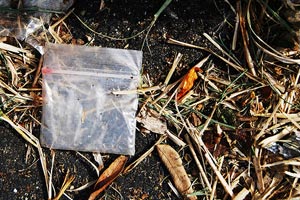
Flickr/<a href="http://www.flickr.com/photos/sidewalk_flying/" target="_blank">sidewalk flying</a>
Is it environmentally efficient to wash all of our Ziploc bags for reuse, or do we use more resources than it is worth? And do the bags maintain their integrity for continuous washing, or does the hot water affect their chemical structure? —Econundrums reader Susan B.
I’ve often wondered the same thing: It’d be nice to have an excuse to do away with the annoying task of washing and drying sandwich baggies. Unfortunately, the poor Ziploc bag doesn’t receive nearly as much attention as its politically polarizing cousin, the plastic grocery bag: While countless studies have weighed the pros and cons of shopping bags, as far as I can tell, no one has ever published a single life-cycle analysis of the Ziploc baggie. (SC Johnson, owner of the Ziploc brand, conducted one when they were formulating their new Evolve bag, but they didn’t share it with me.)
What we do know is that like grocery bags, most sandwich baggies are made of polyethylene, a substance derived from natural gas. Although sandwich bags are smaller and denser than grocery bags, the two kinds actually weigh about the same: .01 pounds each. So allow me a back-of-the-napkin calculation: One study (PDF) showed that 58 gallons of water were required to produce 1500 plastic grocery bags—about .04 gallons of water per bag. Let’s say it takes you five seconds to wash out a baggie. Since most kitchen faucets flow at about two gallons per minute, that’s roughly .17 gallons of water per washing, or four times the amount required to make a new plastic bag.
But despite the water cost, the other benefits of reusing baggies—savings on raw materials, emissions from shipping, and landfill space—make washing worthwhile, says Darby Hoover, a senior resource specialist at the Natural Resources Defense Council. “When plastic bags are reused, fewer plastic bags need to be produced,” writes Hoover. “The production of plastic bags uses energy, water, and in most cases a non-renewable resource (fossil fuel-derived); reusing bags, even when you use water to wash them out, saves resources overall.”
As for using hot water for washing: There’s been some concern that chemicals from bags leach into foods at high temperatures (and Ziploc doesn’t recommend microwaving or boiling its standard sandwich bags), though I haven’t seen any studies about whether hot washing changes the chemical structure of a bag. If you’re worried, you could always use cold water and a little soap. But “if they change color or opacity, I’d say that to be on the safe side, you should discontinue using them,” warns Hoover. “I’d also caution against reusing bags that have held raw meat, greasy food, or anything else that might be difficult to rinse out entirely.”
Depending on where you live, you might be able to recycle old baggies. Better yet: You could invest in good quality reusable baggies instead. ReusableBags.com sells a bunch, in all different sizes and patterns.
Got a burning question? Submit your environmental dilemmas to econundrums@motherjones.com. Get all your green questions answered by signing up for our weekly Econundrums newsletter here.











